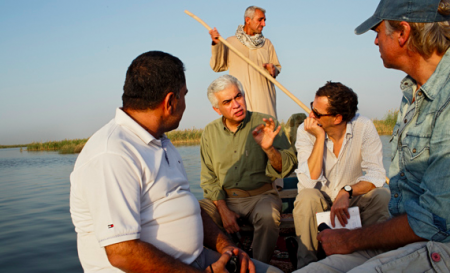Mon, Apr 15, 2013
The Mesopotamian marshlands in southern Iraq are known by many as the birthplace of civilization. Situated between the Tigris and Euphrates rivers, the area was once an oasis of aquatic wildlife filled with lush reed beds, water buffalo, lions, foxes and otters. It was also one of the world’s most important migratory flyways for birds.
In the mid-1990s, Saddam Hussein burned, drained and poisoned the area in retaliation of Shiite Arabs, who had staged uprisings following the Kuwait invasion and fled to the marshes for refuge. The wetlands once known as the Garden of Eden turned to dust bowls, driving out the descendants of ancient Sumerians who had inhabited the area for thousands of years.
When the Hussein regime fell, Alwash knew the time had come for him to go back to restore the beloved marshes of his childhood. In 2003, he made the difficult choice of giving up a comfortable life in California and moved back to war-torn Iraq, with the hopes that one day his own daughters might be able to see the place he had loved as a child.
Once he got past the initial shock of seeing the drained marshes for the first time, Azzam Alwash took on the seemingly impossible challenge of bringing environmental protection to the forefront of a nation focused on restoring peace and rebuilding infrastructure. In 2004, Alwash founded the nonprofit Nature Iraq and put his experience in hydraulic engineering to use, surveying the region and developing a master plan to restore the marshes. He reached out to the environment and water resource ministries to educate government officials about the environmental, social and economic benefits of restoring the marshes.
To read more about Alwash's work, click here.
To read the full piece from The Goldman Environmental Prize, click here.




